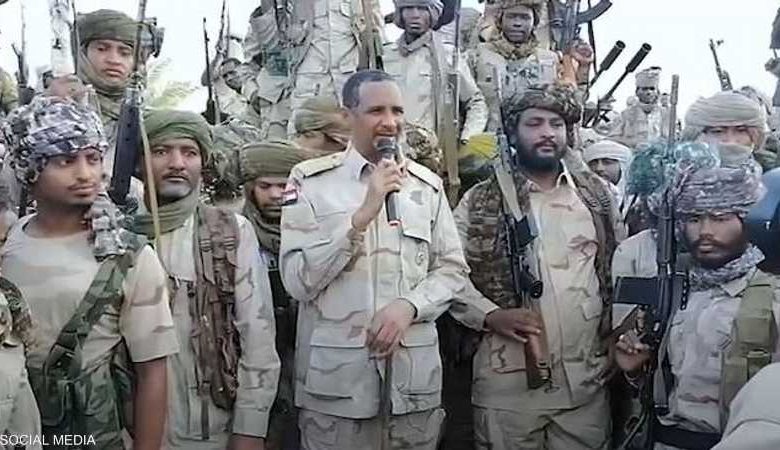Who Leads the Rapid Support Forces After Hemedti’s Disappearance?

Report by: Abdulraouf Taha
Last week, The Wall Street Journal revealed that the leader of Sudan’s Rapid Support Forces (RSF), Mohamed Hamdan Dagalo (Hemedti), has been absent from the battlefield for months. This has reportedly caused widespread dissatisfaction among his troops, who feel abandoned.
Hemedti’s absence from the front lines, especially in the capital, Khartoum, raises many questions about the leadership of the RSF, which has been fighting the Sudanese army since mid-April 2023.
RSF’s Top Leadership
The hierarchical structure of the RSF places Mohamed Hamdan Dagalo (Hemedti) as the first-in-command, his brother Abdel Rahim Hamdan Dagalo as the second-in-command, and Issam Fadheel as the third-in-command. Below them are commanders of military operations, intelligence, logistics, guidance, and services, followed by sector commanders in RSF-controlled areas.
Recently, Hemedti has not been present in the field. His appearances have been limited to brief video clips from an office setting, in which he delivers messages.
Throughout the war, Hemedti has only appeared twice among his forces:
At the start of the conflict, when he was seen standing on an armored vehicle wearing a kadamool (a distinctive RSF leader’s headscarf).
In July 2023, when RSF media claimed he appeared with his troops in Khartoum.
Following Hemedti’s disappearance from Khartoum, his brother Abdel Rahim Dagalo has also been absent from the front lines. Recent videos place him in the remote desert areas of North Darfur, overseeing battles between his forces and the Sudanese army-aligned Joint Forces.
This raises a key question: If both Hemedti and Abdel Rahim are absent, who is leading the RSF?
Leadership in Khartoum
Until recently, Major General Issam Fadheel, the RSF’s third-in-command, was in charge of operations in Khartoum. He is a former Sudanese army officer (Class 35) who was retired but later reinstated and assigned to the RSF. During the war, Hemedti tasked him with overseeing the RSF’s “Negative Phenomena Committee.”
According to sources who spoke to Al Jazeera, Fadheel was injured during one of these operations by RSF elements themselves. RSF defector Abu Aqila Kikel claimed in a leaked audio recording that Fadheel has since left Khartoum.
This means that all three top RSF leaders are now absent from Khartoum.
According to Al Jazeera sources, the RSF’s operations in Khartoum are now managed by an operations room led by Brigadier General Issa Bashara, the RSF’s intelligence chief and a close confidant of Hemedti. Bashara, who hails from the Rizeigat Mahariya tribe, holds significant influence within the RSF.
Bashara has been in charge of RSF intelligence since the war began, after his predecessor, Major General Al-Khair Abdullah “Abu Mureidat,” left his post in the early hours of the conflict. Sources say Abu Mureidat, a former Sudanese army officer, refused to participate in the war.
Bashara operates from the Taif neighborhood and frequently moves between offices in East Khartoum. He directly oversees RSF military operations and detention centers in Soba and Riyadh, south of Khartoum.
Another key RSF figure is Brigadier General Osman Hamid, known as “Osman Operations,” who is responsible for RSF combat operations. Like Fadheel, he is a former Sudanese army officer who was seconded to the RSF. He defied orders from Army Chief Abdel Fattah al-Burhan to terminate his RSF assignment at the start of the war.
Sources told Al Jazeera that Osman Hamid supervises RSF military operations in Khartoum and Gezira and holds considerable influence within the force. Since the war began, he has only appeared publicly once—when RSF forces seized the army garrison in Jebel Awliya, south of Khartoum. He has been sanctioned by both the European Union and the United Nations Security Council.
Current RSF Field Commanders in Khartoum
Colonel Hassan Mohamed Abdullah (“Hassan Al-Turabi”) oversees services and guidance in the RSF and commands forces in the Mogran area of central Khartoum. He operates from the strategic battalion base that the RSF seized from the army.
Colonel Moussa Hamid Ambilo was responsible for RSF operations in Khartoum North. However, sources say he has disappeared in recent months after previously moving between Bahri and Omdurman.
Major General Idris Hassan has since taken over RSF operations in Bahri. He was previously a field commander in Darfur before the war. After the army recaptured Bahri, he relocated to East Khartoum.
Colonel Moussa Nilo was in charge of RSF forces at the Jaili Refinery north of Khartoum. Sources indicate he left the site well before the army retook control.
RSF Leadership in Darfur
Darfur remains a major battleground, with intense clashes between the RSF and the army-supported Joint Forces, particularly in El-Fasher, the last army stronghold in the region.
Abdel Rahim Dagalo oversees RSF operations in Darfur. He was recently seen in desert areas, mobilizing troops for the battle in El-Fasher.
Major General Abdul Rahman Juma Barkallah commands RSF forces in West Darfur. He has been sanctioned by the EU and the UN for alleged crimes against humanity. He is accused of involvement in the murder of West Darfur Governor Khamis Abakar.
Colonel Saleh Al-Fouti leads RSF forces in Nyala, South Darfur. A close associate of Abdel Rahim Dagalo, he was involved in the capture of army bases in Um Dafoug and Nyala.
Major General Al-Nour Al-Qibba commands RSF forces in El-Fasher. He previously served in Musa Hilal’s Border Guards before they were integrated into the RSF.
RSF Leadership in Kordofan
The RSF controls significant parts of West and North Kordofan, including Muglad, Al-Fula, Abu Zabad, and Al-Rahad.
Colonel Al-Taj Al-Tijani commands RSF forces in Greater Kordofan. He operates from Muglad but was reportedly injured in a battle with the army.
Major Hussein Barsham led RSF operations in North Kordofan from Um Rawaba before it was recaptured by the army. He was wounded in clashes at Al-Ghabsha and later retreated to Al-Rahad.
Makin Al-Sadiq leads RSF forces in Abu Zabad, southwest Kordofan. Sources say he lacks influence, and his troops are mainly involved in looting and extortion.



